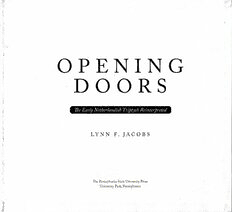Download Opening Doors. The Early Netherlandish Triptych Reinterpreted PDF Free - Full Version
Download Opening Doors. The Early Netherlandish Triptych Reinterpreted by Lynn F. Jacobs in PDF format completely FREE. No registration required, no payment needed. Get instant access to this valuable resource on PDFdrive.to!
About Opening Doors. The Early Netherlandish Triptych Reinterpreted
Opening Doors is the first book of its kind: a comprehensive study of the emergence and evolution of the Netherlandish triptych from the early fifteenth through the early seventeenth centuries. The modern term “triptych” did not exist during the period Lynn Jacobs discusses. Rather, contemporary French, Dutch, and Latin documents employ a very telling description―they call the triptych a “painting with doors.” Using this term as her springboard, Jacobs considers its implications for the structure and meaning of the triptych. The fundamental nature of the format created doors that established thresholds, boundaries, and interconnections between physical parts of the triptych―the center and wings, the interior and the exterior―and between types of meaning, the sacred and the earthly, different narrative moments, different spaces, different levels of status, and, ultimately, different worlds. Moving chronologically from early triptychs such as Campin’s Mérode Triptych and Van Eyck’s Dresden Triptych to sixteenth-century works by Bosch, and closing with a discussion of Rubens, Jacobs considers how artists negotiated the idea of the threshold. From her analysis of Campin’s ambiguous divisions between the space represented across the panels, to Van der Weyden’s invention of the “arch motif” that organized relations between the viewer and the painting, to Van der Goes’s complex hierarchical structures, to Bosch’s unprecedentedly unified spaces, Jacobs shows us how Netherlandish artists’ approach to the format changed and evolved, culminating in the early seventeenth century with Rubens’s great Antwerp altarpieces.
Detailed Information
| Author: | Lynn F. Jacobs |
|---|---|
| Publication Year: | 2012 |
| ISBN: | 9780271048406 |
| Pages: | 409 |
| Language: | English |
| File Size: | 229.635 |
| Format: | |
| Price: | FREE |
Safe & Secure Download - No registration required
Why Choose PDFdrive for Your Free Opening Doors. The Early Netherlandish Triptych Reinterpreted Download?
- 100% Free: No hidden fees or subscriptions required for one book every day.
- No Registration: Immediate access is available without creating accounts for one book every day.
- Safe and Secure: Clean downloads without malware or viruses
- Multiple Formats: PDF, MOBI, Mpub,... optimized for all devices
- Educational Resource: Supporting knowledge sharing and learning
Frequently Asked Questions
Is it really free to download Opening Doors. The Early Netherlandish Triptych Reinterpreted PDF?
Yes, on https://PDFdrive.to you can download Opening Doors. The Early Netherlandish Triptych Reinterpreted by Lynn F. Jacobs completely free. We don't require any payment, subscription, or registration to access this PDF file. For 3 books every day.
How can I read Opening Doors. The Early Netherlandish Triptych Reinterpreted on my mobile device?
After downloading Opening Doors. The Early Netherlandish Triptych Reinterpreted PDF, you can open it with any PDF reader app on your phone or tablet. We recommend using Adobe Acrobat Reader, Apple Books, or Google Play Books for the best reading experience.
Is this the full version of Opening Doors. The Early Netherlandish Triptych Reinterpreted?
Yes, this is the complete PDF version of Opening Doors. The Early Netherlandish Triptych Reinterpreted by Lynn F. Jacobs. You will be able to read the entire content as in the printed version without missing any pages.
Is it legal to download Opening Doors. The Early Netherlandish Triptych Reinterpreted PDF for free?
https://PDFdrive.to provides links to free educational resources available online. We do not store any files on our servers. Please be aware of copyright laws in your country before downloading.
The materials shared are intended for research, educational, and personal use in accordance with fair use principles.

